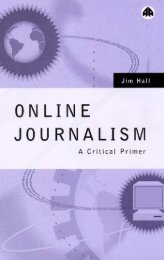Modul Mata Kuliah Journalisme Online - Ayo Menulis FISIP UAJY
Modul Mata Kuliah Journalisme Online - Ayo Menulis FISIP UAJY
Modul Mata Kuliah Journalisme Online - Ayo Menulis FISIP UAJY
Create successful ePaper yourself
Turn your PDF publications into a flip-book with our unique Google optimized e-Paper software.
“I can’t believe the argument that the citizen should not be part of journalism. It means you don’t trust<br />
your public”<br />
Charlie Beckett<br />
Panelists<br />
Andrew Keen, author<br />
Charlie Beckett, Founding Director, POLIS<br />
Dr Andrew Calcutt, Principal Lecturer in Creative Industries and Cultural Studies and Programme Leader,<br />
MA Journalism and Society, School of Social Sciences, Media and Cultural Studies, University of East<br />
London<br />
Chair<br />
Claire Fox, director, Institute of Ideas<br />
Overviews<br />
Charlie Beckett The news media is for what it always was for. It can be a watchdog, informer, educator,<br />
entertainer, campaigner, profit-maker or forum. Journalism in ‘professional’ or ‘amateur’ form can be a<br />
force for good or ill. There is nothing immutable or inevitable about news media. But new technologies<br />
combined with changing social and economic forces open up the possibilities (and threats) of new<br />
communications systems and processes. By embracing a more connected and open form of news media<br />
that encourages public participation I believe that journalism can enhance and transform itself as a<br />
practice and as a part of the public discourse and political activity.<br />
Andrew Keen The purpose of the media is to inform people what is happening in both their own<br />
countries and the world. This is the foundation for creating a responsible citizenship and is one of the<br />
great challenges in western democracies, where we increasingly regard citizenship in terms of selfexpression<br />
rather than self-knowledge.<br />
Andrew Calcutt Media (plural) are for more than one thing. But plurality does not exclude priority – nor<br />
should it. As media professionals, we should take the lead in establishing the primary purpose of media.<br />
Partly because we professionals have failed to take a strong lead, in the recent period media have<br />
tended to become the means through which many people make a spectacle of themselves. In usergenerated-content,<br />
non-professionals upload themselves as wares for others to share; meanwhile we<br />
media people are often ready to drop the cogito and adapt our professionalism to the principle of<br />
manifesto ergo sum.<br />
Not all these developments are negative, since they represent an attempt to continue the social by<br />
means other than the political. But they are a weak attempt upon a substantial task, and we<br />
professionals are culpable if we allow others to invest themselves in something so insufficient. Instead,<br />
we should champion objectivity as the essential counterpart to human history-making subjectivity. Not<br />
the ‘objectivity’ from which the majority were excluded, but the collaborative and contentious process<br />
of making the world as reproduced in human knowledge of it, correspond to the world which only we
















